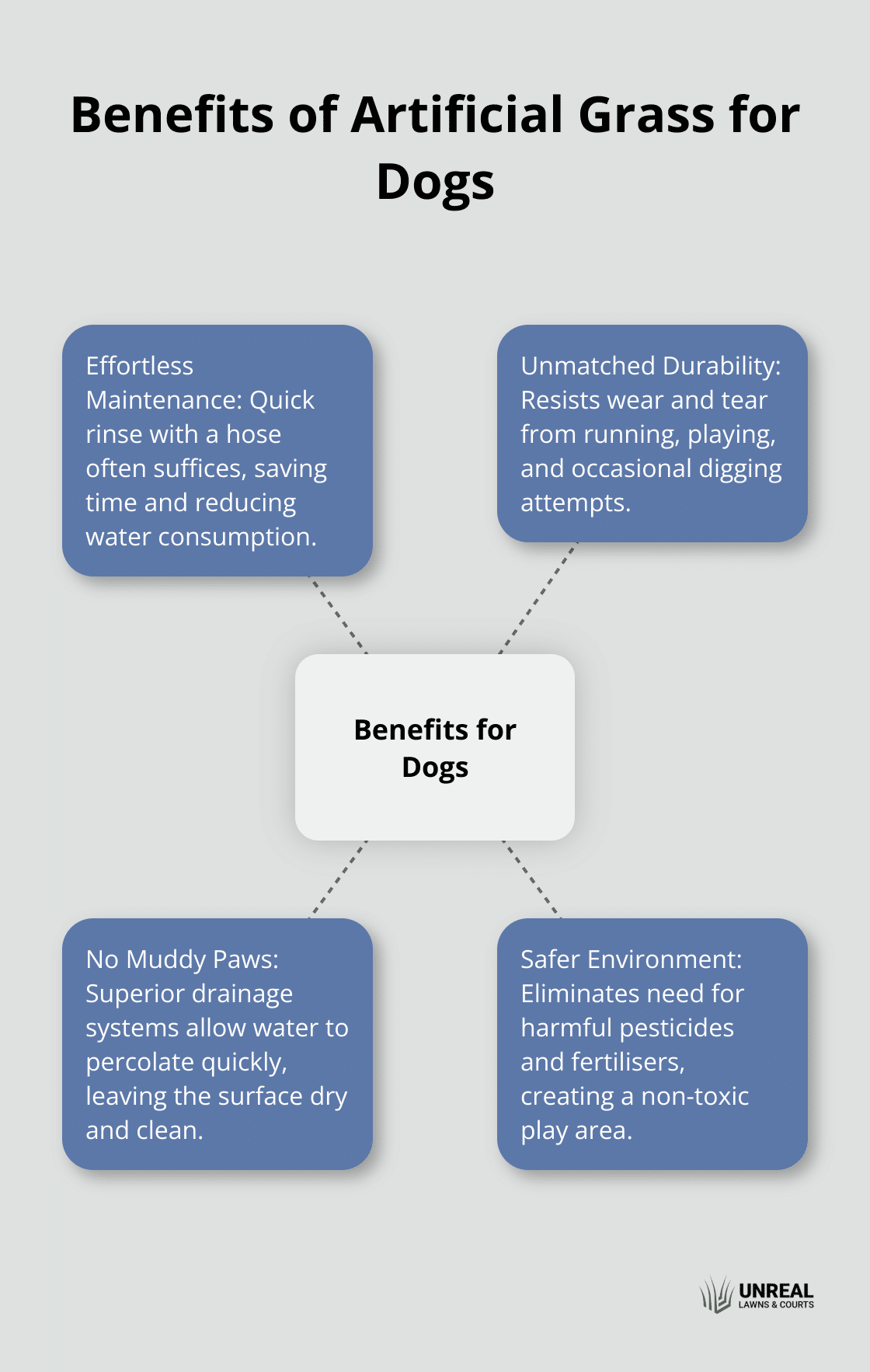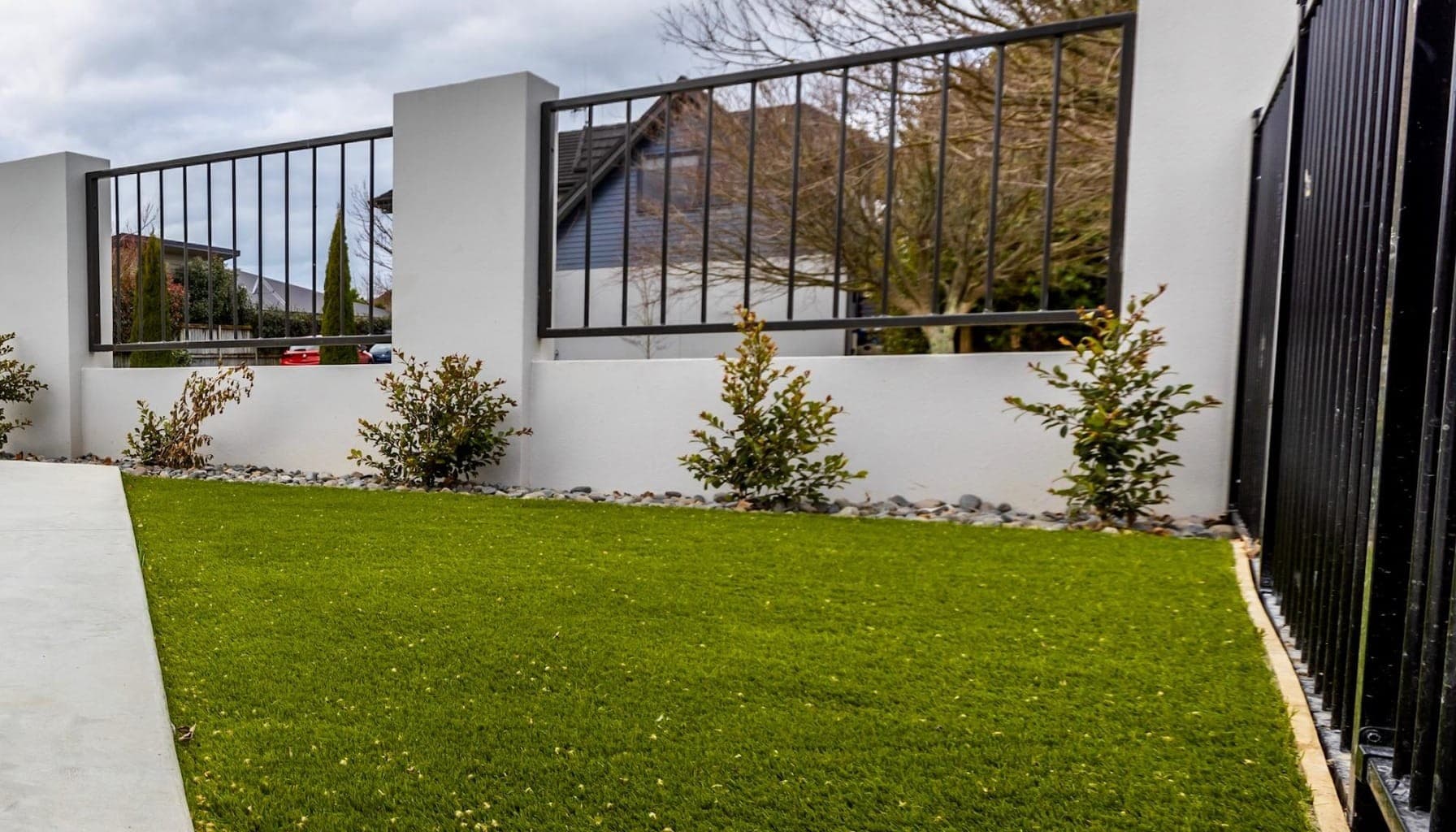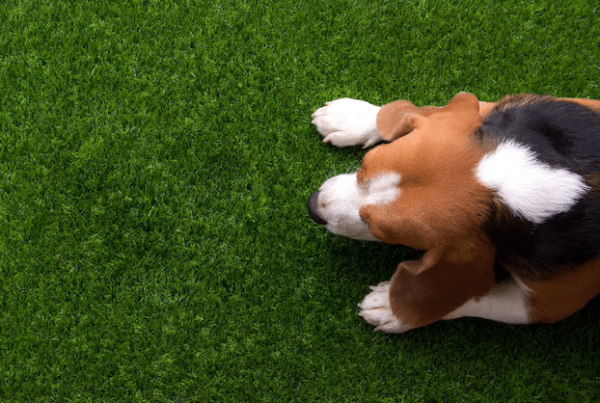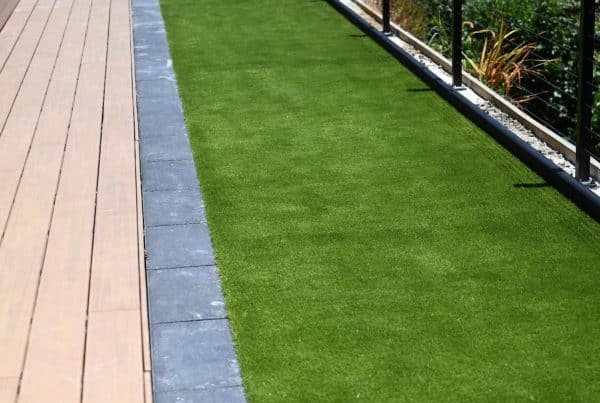At Unreal Lawns & Courts, we understand the unique challenges dog owners face when maintaining their home. Artificial grass and dogs can be a perfect match, offering a low-maintenance solution that keeps both pets and owners happy.
This guide will explore the benefits, address common concerns, and provide practical tips for installing pet-friendly artificial turf. We’ll help you make an informed decision about whether synthetic grass is the right choice for your furry friends and your outdoor space.
Why Artificial Grass is a Game-Changer for Dog Owners
Artificial grass revolutionises outdoor spaces for dog owners, offering a host of benefits that natural lawns simply can’t match. Pet owners across New Zealand have discovered how synthetic turf transforms their lives and the lives of their furry companions.
Effortless Maintenance and Cleaning
Natural lawns demand constant mowing, watering, and fertilising. Artificial grass eliminates these chores, staying pristine year-round with minimal effort. A quick rinse with a hose often suffices to clean up after your dog. For more thorough cleaning, a deodoriser effectively neutralises odours. This simple maintenance routine saves dog owners countless hours and reduces water consumption compared to natural lawns.
Unmatched Durability for Active Dogs
High-quality artificial turf stands up to the most energetic canines. The dense fibres and sturdy backing resist wear and tear from running, playing, and even occasional digging attempts. Properly installed artificial grass can withstand heavy use without significant degradation when chosen with good durability and UV stabilisation to prevent fading. This durability ensures your lawn remains lush and inviting, no matter how active your dog may be.
No More Muddy Paws
One of the most appreciated benefits of artificial grass is the elimination of mud. Muddy paw prints tracked through your home after a rainy day or sprinkler session become a thing of the past. The superior drainage systems in modern artificial turf allow water to percolate quickly, leaving the surface dry and clean. This feature not only keeps your home cleaner but also reduces the time spent bathing your dog after outdoor play.

A Safer Environment for Your Pet
Artificial grass offers unique benefits for families with pets and allergy sufferers. It eliminates the need for harmful pesticides and fertilisers that can be toxic to dogs. Synthetic turf creates a safer play area for your pet, free from these dangerous substances. Additionally, the absence of grass allergens can be a relief for dogs with sensitivities, allowing them to enjoy the outdoors without discomfort. Susceptible animals can become allergic to pollens from grasses, trees, and weeds, as well as dust mites, mould, and fungal spores.
The benefits of artificial grass for dog owners are clear, but some pet owners may have concerns about this synthetic alternative. Let’s address these common worries and explore how modern artificial turf solutions (like those offered by Unreal Lawns) mitigate potential issues.
Pet Owner Concerns About Artificial Grass And Dogs
Heat Management for Hot Days
Heat retention is a valid concern for artificial grass, especially during summer months. On scorching summer days, synthetic turf surfaces can become uncomfortably hot in direct sunlight.
To mitigate heat, we recommend:
- Use Cool yarn technology that reflect more sunlight. Our cool yarn is also antibacterial.
- Install a proper infill that aids in temperature regulation
- Set up shaded areas or use shade sails over parts of your lawn.
These strategies can help make the surface more comfortable for your dog’s paws even in warm weather.
Odour Control and Cleaning Techniques
Proper maintenance is key to control odours and keep your artificial lawn fresh. While synthetic grass allows liquids to drain quickly, regular cleaning is essential, especially in areas frequently used by pets.
For effective odour control:
- Rinse the area with water after your dog urinates
- Use an enzymatic cleaner specifically designed for pet waste on artificial grass
- Apply a mix of water and white vinegar for natural deodorising
- Consider an antimicrobial turf to inhibit bacterial growth
Regular brushing of the turf helps maintain its appearance and prevents matting . With these simple steps, you can keep your artificial lawn smelling fresh and clean.
Artificial Grass And Dogs Safety
Quality artificial grass is designed with pet safety in mind. The materials used are non-toxic and the blades are soft enough to prevent irritation to paws. However, it’s important to choose a product specifically marketed as pet-friendly.
To maximise safety:
- Opt for artificial grass with a shorter pile height (around 30-35mm) for easier movement
- Ensure proper installation with a smooth surface and secure edges
- Regularly inspect the lawn for any wear and tear that could potentially harm paws
The right product selection and proper maintenance can provide a safe and comfortable surface for your dog to play on.
Environmental Impact Considerations
While natural grass has its environmental benefits, artificial turf can be a more sustainable option in many scenarios, especially in areas prone to drought. Synthetic lawns eliminate the need for water-intensive irrigation, reducing water consumption by up to 70% compared to natural lawns.
Additionally, artificial grass doesn’t require harmful pesticides or fertilisers, which can leach into groundwater. The absence of mowing also means no emissions from gas-powered lawn equipment.
The next chapter will guide you through the process of installing artificial grass specifically for dogs, ensuring you create the perfect outdoor space for your furry friends.
How to Install Dog-Friendly Artificial Grass
Selecting Pet-Friendly Artificial Grass
When you choose artificial grass for dogs, select products with shorter pile heights (30-35mm). This length allows easier movement and prevents matting from frequent use. Look for turf with a dense fibre structure and strong backing to withstand wear and tear from active pets. UV-resistant fibres prevent fading and maintain the grass’s appearance over time.
Some pet-specific artificial grass offers enhanced durability, superior drainage, and odour control capabilities. These specialised options can significantly reduce odour retention and make cleaning more efficient. While they may cost more, the long-term benefits often justify the investment for dog owners.
Ground Preparation and Drainage
Effective drainage is essential when you install artificial grass for dogs. Start by excavating the existing soil to a depth of at least 100mm. Create a slight slope (about 1-2%) away from buildings to facilitate water runoff. Next, lay a geotextile cloth to separate the base materials from the subsoil.
Install a base layer of 80mm of compacted aggregate (such as crushed rock Gap/20). This layer provides stability and aids in drainage. Top it with a finer aggregate layer (about 20mm) to create a smooth surface for the turf. Compact each layer thoroughly to ensure proper drainage and prevent future settling.
For areas with heavy pet use, install a specialised drainage system beneath the turf. Options include perforated pipes or a grid system that channels water away more efficiently. This extra step can significantly improve odour control and prevent waterlogging in high-traffic pet areas.
Maintenance Tips
Regular maintenance keeps your pet-friendly artificial grass in top condition. Rinse the surface frequently, especially in areas where your dog urinates. Use pet-specific enzymatic cleaners to break down waste and neutralise odours. Brush the turf regularly to prevent matting and maintain its upright appearance.
Final Thoughts
Artificial grass and dogs form an excellent combination for pet owners who want a low-maintenance, durable, and clean outdoor space. The benefits of synthetic turf extend far beyond its aesthetic appeal, offering practical solutions to common challenges faced by dog owners. From eliminating muddy paws to providing a safer environment free from harmful chemicals, artificial grass transforms the way pets and their owners interact with their outdoor spaces.
Proper installation and maintenance maximise the advantages of artificial grass for dog owners. Selecting the right type of turf, ensuring adequate drainage, and implementing effective cleaning routines allow pet owners to enjoy a lush, green lawn that withstands active dogs. The initial investment in quality artificial grass pays off through reduced water bills, eliminated lawn care costs, and increased outdoor enjoyment for both pets and their families.
Dog owners in New Zealand who want to upgrade their outdoor spaces can find premium artificial grass solutions at Unreal Lawns & Courts. Their durable, pet-friendly synthetic turf options provide the perfect balance of functionality and aesthetics (ensuring a beautiful and practical outdoor environment). Choosing artificial grass allows dog owners to say goodbye to traditional lawn maintenance hassles and hello to more quality time with their furry companions in a clean, safe, and inviting outdoor space.





